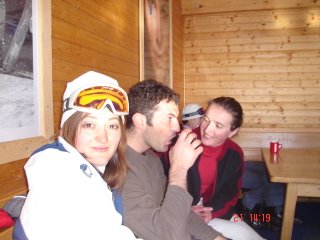"Tribal workers"(Borrowed from today's Financial Times, European Edition - please don't sue me)
Today's generation of high-earning professionals maintain that their personal fulfillment comes from their jobs and the hours they work. They should grow up, says Thomas Barlow.
A friend of mine recently met a young American woman who was studying on a Rhodes Scholarship at Oxford. She already had two degrees from top US universities, had worked as a lawyer and as a social worker in the US, and somewhere along the way had acquired a black belt in kung fu.
Now, however, her course at Oxford was coming to an end and she was thoroughly angst-ridden about what to do next.
Her problem was no ordinary one. She couldn't decide whether she should make a lot of money as a corporate lawyer/management consultant, devote herself to charity work helping battered wives in disadvantaged communities, or go to Hollywood to work as a stunt double in kung fu films.
What most struck my friend was not the disparity of this woman's choices, but the earnestness and bad grace with which she ruminated on them. It was almost as though she begrudged her own talents, opportunities and freedom - as though the world had treated her unkindly by forcing her to make such a hard choice.
Her case is symptomatic of our times. In recent years, there has grown up a culture of discontent among the highly educated young, something that seems to flare up, especially, when people reach their late 20s and early 30s. It arises not from frustration caused by lack of opportunity, as may have been true in the past, but from an excess of possibilities.
Most theories of adult developmental psychology have a special category for those in their late 20s and early 30s. Whereas the early to mid-20s are seen as a time to establish one's mode of living, the late 20s to early 30s are often considered a period of reappraisal.
In a society where people marry and have children young, where financial burdens accumulate early, and where job markets are inflexible, such reappraisals may not last long. But when people manage to remain free of financial or family burdens, and where the perceived opportunities for alternative careers are many, the reappraisal is likely to be angst-ridden and long lasting.
Among no social group is this more true than the modern, international, professional elite: that tribe of young bankers, lawyers, consultants and managers for whom financial, familial, personal, corporate and (increasingly) national ties have become irrelevant.
Often they grew up in one country, were educated in another, and are now working in a third. They are independent, well paid, and enriched by experiences that many of their parents could only dream of. Yet, by their late 20s, many carry a sense of disappointment: that for all their opportunities, freedoms and achievements, life has not delivered quite what they had hoped.
At the heart of this disillusionment lies a new attitude towards work. The idea has grown up, in recent years, that work should not be just a means to an end a way to make money, support a family, or gain social prestige - but should provide a rich and fulfilling experience in and of itself.
Jobs are no longer just jobs; they are lifestyle options.
Recruiters at financial companies, consultancies and law firms have promoted this conception of work. Job advertisements promise challenge, wide experiences, opportunities for travel and relentless personal development.
Michael is a 33-year-old management consultant who has bought into this vision of late-20th century work. Intelligent and well-educated - with three degrees, including a doctorate - he works in Munich, and has a "stable, long-distance relationship" with a woman living in California. He takes 140 flights a year and works an average of 80 hours a week. Some weeks he works more than 100 hours.
When asked if he likes his job, he will say: "I enjoy what I'm doing in terms of the intellectual challenges."
Although he earns a lot, he doesn't spend much. He rents a small apartment, though he is rarely there, and has accumulated very few possessions. He justifies the long hours not in terms of wealth-acquisition, but solely as part of a "learning experience".
This attitude to work has several interesting implications, mostly to do with the shifting balance between work and non-work, employment and leisure.
Because fulfilling and engrossing work - the sort that is thought to provide the most intense learning experience - often requires long hours or captivates the imagination for long periods of time, it is easy to slip into the idea that the converse is also true: that just by working long hours, one is also engaging in fulfilling and engrossing work.
This leads to the popular fallacy that you can measure the value of your job and, therefore, the amount you are learning from it) by the amount of time you spend on it. And, incidentally, when a premium is placed on learning rather than earning, people are particularly susceptible to this form of self-deceit.
Thus, whereas in the past, when people in their 20s or 30s spoke disparagingly about nine-to-five jobs it was invariably because they were seen as too routine, too unimaginative, or too bourgeois. Now, it is simply because they don't contain enough hours.
Young professionals have not suddenly developed a distaste for leisure, but they have solidly bought into the belief that a 45-hour week necessarily signifies an unfulfilling job.
Jane, a 29-year-old corporate lawyer who works in the City of London, tells a story about working on a deal with another lawyer, a young man in his early 30s. At about 3am, he leant over the boardroom desk and said: Isn't this great? This is when I really love my job."
What most struck her about the remark was that the work was irrelevant (she says it was actually rather boring); her colleague simply liked the idea of working late. "It's as though he was validated, or making his life important by this," she says.
Unfortunately, when people can convince themselves that all they need do in order to lead fulfilled and happy lives is to work long hours, they can quickly start to lose reasons for their existence.
As they start to think of their employment as a lifestyle, fulfilling and rewarding of itself - and in which the reward is proportional to hours worked - people rapidly begin to substitute work for other aspects of their lives.
Michael, the management consultant, is a good example of this phenomenon. He is prepared to trade (his word) not just goods and time for the experience afforded by his work, but also a substantial measure of commitment in his personal relationships. In a few months, he is being transferred to San Francisco, where he will move in with his girlfriend. But he's not sure that living in the same house is actually going to change the amount of time he spends on his relationship. "Once I move over, my time involvement on my relationship will not change significantly. My job takes up most of my time and pretty much dominates what I do, when, where and how I do it," he says.
Moreover, the reluctance to commit time to a relationship because they are learning so much, and having such an intense and fulfilling time at work is compounded, for some young professionals, by a reluctance to have a long-term relationship at all. Today, by the time someone reaches 30, they could easily have had three or four jobs in as many different cities - which is not, as it is often portrayed, a function of an insecure global job-market, but of choice.
Robert is 30 years old. He has three degrees and has worked on three continents. He is currently working for the United Nations in Geneva. For him, the most significant deterrent when deciding whether to enter into a relationship is the likely transient nature of the rest of his life.
"What is the point in investing all this emotional energy and exposing myself in a relationship, if I am leaving in two months, or if I do not know what I am doing next year?" he says.
Such is the character of the modern, international professional, at least throughout his or her 20s. Spare time, goods and relationships, these are all willingly traded for the exigencies of work. Nothing is valued so highly as accumulated experience. Nothing is neglected so much as commitment.
With this work ethic - or perhaps one should call it a professional development ethic" - becoming so powerful, the globally mobile generation now in its late 20s and early 30s has garnered considerable professional success.
At what point, though, does the experience-seeking end? Kathryn is a successful American academic, 29, who bucked the trend of her generation: she recently turned her life round for someone else. She moved to the UK, specifically, to be with a man, a decision that she says few of her contemporaries understood.
"We're not meant to say: 'I made this decision for this person. Today, you're meant to do things for yourself. If you're willing to make sacrifices for others - especially if you're a woman - that's seen as a kind of weakness. I wonder, though, is doing things for yourself really empowerment, or is liberty a kind of trap?" she says.
For many, it is a trap that is difficult to break out of, not least because they are so caught up in a culture of professional development. And spoilt for choice, some like the American Rhodes Scholar no doubt become paralysed by their opportunities, unable to do much else in their lives, because they are so determined not to let a single one of their chances slip.
If that means minimal personal commitments well into their 30s, so be it. "Loneliness is better than boredom" is Jane's philosophy. And, although she knows "a lot of professional single women who would give it all up if they met a "rich man to marry", she remains far more concerned herself about finding fulfilment at work.
"I am constantly questioning whether I am doing the right thing here," she says. "There's an eternal search for a more challenging and satisfying option, a better lifestyle. You always feel you're not doing the right thing, always feel as if you should be striving for another goal," she says.
Jane, Michael, Robert and Kathryn grew up as part of a generation with fewer social constraints determining their futures than has been true for probably any other generation in history. They were taught at school that when they grew up they could "do anything", "be anything". It was an idea that was reinforced by popular culture, in films, books and television.
The notion that one can do anything is clearly liberating. But life without constraints has also proved a recipe for endless searching, endless questioning of aspirations. It has made this generation obsessed with self-development and determined, for as long as possible, to minimise personal commitments in order to maximise the options open to them.
One might see this as a sign of extended adolescence. Eventually, they will be forced to realise that living is as much about closing possibilities as it is about creating them.



